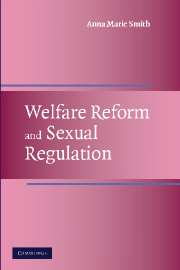Book contents
- Frontmatter
- Contents
- Acknowledgments
- Introduction
- 1 From Paternafare to Marriage Promotion: Sexual Regulation and Welfare Reform
- 2 Biopower and Sexual Regulation
- 3 Post-Foucauldian Sexual Regulation Theory
- 4 The Ideological Construction of Paternafare
- 5 Paternafare Law Today
- 6 Welfare Reform, Reproductive Heterosexuality, and Marriage
- 7 The Normative Assessment of Paternafare: An Ideal-Type Analysis
- 8 Feminist Visions
- Appendix I Gender, Race, and the TANF Population
- Appendix II Family Structure and Poverty
- Appendix III Child Support Enforcement Allocations in a Neoliberal Fiscal Environment
- Appendix IV The “Swarming” of Paternafare
- Appendix V The Disconnection between Poverty and TANF Assistance
- Appendix VI Race, Ethnicity, and the Family Cap
- Index
4 - The Ideological Construction of Paternafare
Published online by Cambridge University Press: 05 June 2012
- Frontmatter
- Contents
- Acknowledgments
- Introduction
- 1 From Paternafare to Marriage Promotion: Sexual Regulation and Welfare Reform
- 2 Biopower and Sexual Regulation
- 3 Post-Foucauldian Sexual Regulation Theory
- 4 The Ideological Construction of Paternafare
- 5 Paternafare Law Today
- 6 Welfare Reform, Reproductive Heterosexuality, and Marriage
- 7 The Normative Assessment of Paternafare: An Ideal-Type Analysis
- 8 Feminist Visions
- Appendix I Gender, Race, and the TANF Population
- Appendix II Family Structure and Poverty
- Appendix III Child Support Enforcement Allocations in a Neoliberal Fiscal Environment
- Appendix IV The “Swarming” of Paternafare
- Appendix V The Disconnection between Poverty and TANF Assistance
- Appendix VI Race, Ethnicity, and the Family Cap
- Index
Summary
The Personal Responsibility and Work Opportunity Reconciliation Act can be seen as the culmination of an effort on the part of conservatives to roll back the gains of the poverty rights movement – including the Supreme Court's rulings that established a statutory right to poverty assistance. In King v. Smith, the Court struck down the “substitute father” rule that many states were using to keep needy black mothers off the rolls. After the decision was handed down in 1968, conservatives began to search for new ways to restrict the AFDC program. King contributed to the federalization of poverty assistance rights insofar as the Court's decision gave the poor some protection against the arbitrariness and stinginess of the states. The conservatives who mounted a backlash against the poverty rights movement seized upon devolution as their primary legislative tactic, but they did so in a complex manner. Under specific AFDC provisions adopted in the late 1980s, many states successfully applied for “waivers,” while the PRA itself eliminated the statutory right to assistance and massively enhanced state autonomy. To some extent, however, the devolution narrative is a ruse that allows the neoliberals to conceal their increasing investment in federal mechanisms designed to punish and police the poor. The federal government is not, in fact, melting away. Even as it sheds its redistributive obligations, and even as it awards service delivery contracts to religious organization and private corporations, the federal government is steadily enhancing its social control apparatus.
- Type
- Chapter
- Information
- Welfare Reform and Sexual Regulation , pp. 85 - 117Publisher: Cambridge University PressPrint publication year: 2007



